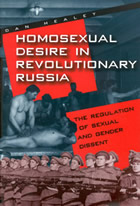Author's response
| Book: | Homosexual Desire in Revolutionary RussiaDan HealeyUniversity of Chicago Press, Chicago, 2001; ISBN 0226322335, pp. 376 |
| Reviewer: | Daniel BeerUniversity of Cambridge |
Daniel Beer's review is generous and attentive, and his careful reading of my book has stimulated me to reflect on its arguments, which I want to clarify and extend here.
It would be unfortunate to conclude that the book slights women. True, its focus on regulation inherently concentrates on men and masculinity. Nevertheless, as a gender historian I took great pains to explain the implications for women and femininity at every turn. I especially focused on constructions of femininity in Soviet medicine as a reflection of popular gender notions. Since I am not a literature specialist, I direct readers to the excellent work on Russian lesbians in English and Russian.
Beer and I disagree on concepts of dissent. I like his definition – the 'conscious rejection of prevailing societal norms and some readiness to encounter disciplinary measures' – but his reservation of the concept to resisters of the state is too restrictive. What about resisters of a sex/gender system? I note that Russia's men and women who experienced, and then consciously elected to act on, same-sex desire, concealed what they did and described it in euphemisms. I infer that they were well aware of society's mistrust of same-sex love and demands for gender conformity. I agree that this inference would have been strengthened with more documentation of grassroots homophobia. This was unfeasible given the needle-in-a-haystack nature of the evidence, and time constraints. (This is a first book and the RAE, with typical distorting effect, loomed.) Few works charting popular homophobia in Anglo-American history existed until very recently, and there is shamefully little on Britain (except for Patrick Higgins's encyclopaedic Heterosexual Dictatorship: Male Homosexuality in Postwar Britain (London, 1996)), so the absence of work on Russian homophobia is pardonable just yet.
At some level our disagreement about the agency of 'all and any individuals engaged in same-sex love' is about the politics of historical research. The preservation of a conventional political science model of dissent is not my priority. (The end of political science's domination of the field of Soviet history is overdue.) As a gay historian I write history to advance the understanding of sexual and gender marginals in the past, and I see positive, human values in the actions of my protagonists. A new generation of sexual and gender dissidents in the Russian Federation needs a 'usable past' –and this book is a contribution to that nourishing narrative.

